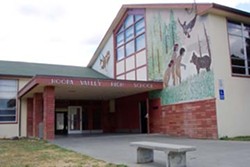Frustrations Mount in Klamath-Trinity School District
ACLU, advocates charge the district isn't doing enough for at-risk, Native youth
By Natalya Estrada[
{
"name": "Top Stories Video Pair",
"insertPoint": "7",
"component": "17087298",
"parentWrapperClass": "fdn-ads-inline-content-block",
"requiredCountToDisplay": "1"
}
]
It's pouring rain in Hoopa. The roads are slick with ice and snow is about to fall as roughly half a dozen people shuffle into a small room for the Klamath-Trinity Joint Unified School District Board meeting in mid-February. The crowd is small but those attending carry the voices of their children, their community and, for this particular region, their tribes.
Erika Tracy was one of those who stood up to address the board.
"There just really seems to be a feeling right now of not having the ability to provide feedback, to engage with the plans, to even access," she says. "Whether it be resources or even just accessing a school board."
Tracy, the executive director of the Hoopa Tribal Education Association, says multiple problems with the district's handing of the Local Control Accountability Plan prompted her, the Hoopa Valley Tribe and the Yurok Tribe, in collaboration with the American Civil Liberties Union, to demand more transparency in how the district spends its limited funds.
"Our attention recently focused on the LCAP but what we're seeing and what we're noticing is that there are a lot of the patterns that are being highlighted with this LCAP," Tracy says. "Needing to have stakeholder engagement, needing to make sure that all of the spending and the planning and all of those pieces are transparent."
Historically, Tracy says, tribes have seen a disparity in the education of their youth that stretches back to the indoctrination of Western boarding schools. This LCAP — a three-year plan, updated annually, that is designed to detail all the district's programs and expenditures — puts that disparity in writing and on record, she says.
In collaboration with the ACLU, Tracy worked to show how the district lets students fall through the cracks. The LCAP was supposed to detail how the district is addressing those students through what's called the Supplemental and Concentration Fund, which allocates nearly $2.2 million for three specific types of students: foster children, English Language Learners and students with low socio-economic status.
Criticisms of the LCAP and the district fell into several categories, such as a lack of transparency and engagement, little accountability in how funds are spent and a lack of a parental advisory committee.
The notion that the $2.2 million in funds designated for at-risk children are being used to cover the district's shortcomings is, according to Superintendent Jon Ray, an oversimplification of the problem. Ray says that the LCAP and the designated funds must demonstrate improvements and goals for the district and its students, a majority of which fall into the three designated at-risk categories.
"I'm supposed to improve services for 95 percent of my students, what about the other 5 percent?" Ray says. "We're all experiencing the same need."
Native students make up approximately 85 percent of the district and the schools within the Klamath-Trinity borders include rural areas and tribal lands, such as the Hoopa and Yurok reservations, as well as parts of the Karuk and Tsungwe ancestral territory. The schools face some funding pitfalls because the campuses are on tribal land, which cannot be taxed for revenue. Ray says it is simply not feasible to correct the LCAP while also providing essential and necessary funding for all of the needs of the students within the district.
"We have about 1,000 square miles in our school district," Ray says. "Our schools reach up until the Siskiyou County line. Each school receives what we call a portioned amount from the S and C funds. What the county and state are saying is that I (had) to fix this. That doesn't mean they're going to give me the funding to do this."
Previously, Tracy worked with the ACLU to establish documented complaints about the 2017-2018 LCAP, which was not addressed or fixed by the district. The 2018-2019 LCAP was addressed and the California Department of Education instructed Ray to improve and revise the document. More specifically, he was instructed to fix the transparency issues that the two tribes and the ACLU brought forward in November, which include more detailed descriptions of programs and how S and C funds are spent. Those changes have been made but Ray says he did not shift funding to different programs. Instead, he simply added more context in the document that specified where the money was going within the schools.
But the revisions took time and Ray did not complete them until several days before it needed the board's approval on Feb. 15.
"I don't have the manpower of these larger districts. I don't have someone to focus on the LCAPS with me," Ray says, adding that the district has ongoing problems that go beyond S and C funds. "I'm up at the high school trying to get the boiler to work. There's construction and a lot of things going on. Sometimes all of the paperwork I need to get done doesn't get done."
The lag on the revised LCAP presented problems for the tribes, parents and community. Tracy argues that the LCAP is supposed to be something that everyone can engage with but they had no time to even look at the document, which is more than 100 pages long.
Ray says he gave the revised LCAP to tribal members and parents involved with the Indian Policies and Procedures Task Force at least a week ahead of the presentation to the school board. However, Tracy, who is also part of the task force, says it did not receive the revised LCAP until Feb. 5 at 10 a.m., less than 24 hours before the task force was slated to review the revisions at its meeting.
"It's hard to get through 111 pages but, thankfully, our allies at the ACLU were awesome at helping us scan through," Tracy said.
Parents within the district, like Alexandra Mojado, are skeptical of the superintendent's reasons behind the delayed LCAP and the lack of transparency. Mojado says her child attends Hoopa Elementary School and she worries about the quality of education there.
"At the end of the day, they still have a legal obligation to do certain things and, really, all we're asking for is additional meetings and community input, which is required," she said. "A lack of resources and a lack of staff shouldn't be an excuse, especially when it directly impacts the students."
Mojado thinks students need more reading intervention and the district should fill vacant positions in the schools to provide more services for students who fall into the three categories addressed by the S and C funds. Mojado says she doesn't know if student needs are currently being met because of the district's ongoing lack of transparency.
"I certainly have not had enough time to review it," she said of the LCAP, adding that the document is distributed online and therefore is not accessible to some within the region. "I'm fortunate enough to have access to internet. Not everyone in this community ... can do that."
Others feel slightly more confident now that they see tribal members and the ACLU advocating to put Native and indigenous children at the forefront of the district's issues.
Meagen Baldy has five children in the KTJUSD school system — four in elementary school and one in high school — and her oldest child graduated from the district last year.
"We're actually kind of stepping up and saying we won't take it anymore," Baldy says. "We want transparency. We want to see more things in our district that we believe are good cultural practices for our kids. We want to see healthier schools all the way. So I feel like it's a good time, even though it looks messy."
The KTJUSD board was required by the California Department of Education to approve the LCAP at its Feb. 15 board meeting, despite some resistance from parents and tribal members who felt uninvolved in the rushed process. The board indicated it was too late to make additional changes to the current LCAP, noting that modifying the existing school year's budget was infeasible, but pledged to offer more opportunities for public engagement moving forward. Specifically, Tracey and others at the meeting were asked to provide input for the 2019-2020 LCAP.
Tracy emphasized that, without the input or engagement with the community, students will continue to fall through the cracks of the system and that the KTJUSD should not treat their children as "throw-away kids." Instead, she said the district needs to focus on cultural and restorative practices to provide the responsive and trauma-informed education the children deserve.
"Every single child that we send there and that we claim as our children deserves an education and it's [the district's] responsibility to provide that for them," she said. "When they're letting some of them fall through the cracks, then it still lands back in our community. So we have a real stake in this."
Since the board's approval of the LCAP last month, Tracy, the Yurok Tribe and the ACLU have sent a letter to the California Department of Education asking it to force the district to take corrective action to address ongoing transparency and engagement problems.
Natalya Estrada is a local journalist living in Arcata. She's frequently found with a chai latte, mic recorder and a smart phone on hand.
Speaking of...
-

'Our Food is Our Medicine'
Mar 28, 2024 -

The Reluctantly Famous Shoshoni Hostler
Feb 15, 2024 -

Full Circle Journey
Oct 26, 2023 - More »
Comments (2)
Showing 1-2 of 2
more from the author
-
McGuire Hosts Offshore Wind Discussion
- May 3, 2019
-
Remembering Bill Thompson
Humboldt celebrates the life of a peace activist, farmer and neighbor
- May 2, 2019
-
A Community Remembers Bill Thompson
- Apr 27, 2019
- More »
Latest in News
Readers also liked…
-
Through Mark Larson's Lens
A local photographer's favorite images of 2022 in Humboldt
- Jan 5, 2023
-
'To Celebrate Our Sovereignty'
Yurok Tribe to host gathering honoring 'ultimate river warrior' on the anniversary of the U.S. Supreme Court ruling that changed everything
- Jun 8, 2023
































